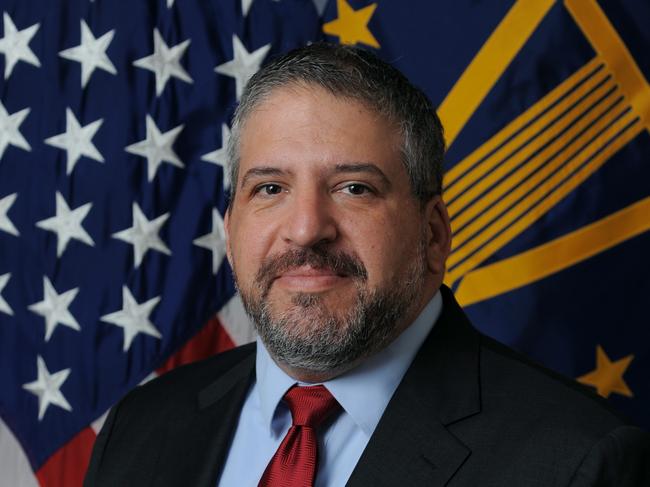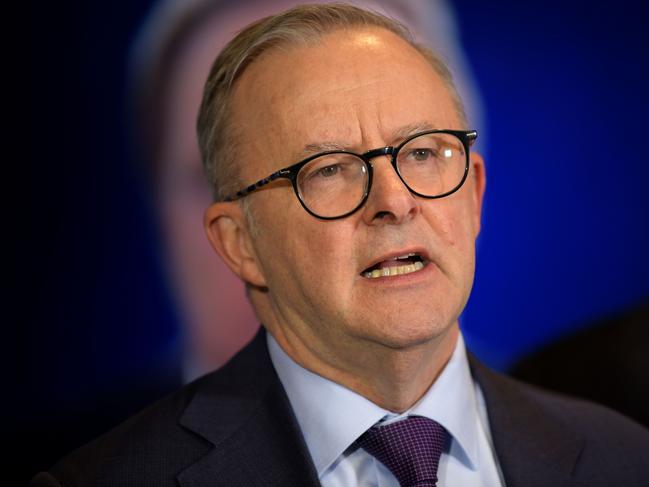Former Pentagon AUKUS tsar Abe Denmark speaks out on progression of nuclear subs pact in Australia
An ex-Pentagon official has warned the Albanese government what it must do to protect the country’s $368 billion nuclear submarine plan pact amid a barrage of criticism.
National
Don't miss out on the headlines from National. Followed categories will be added to My News.
A key American architect of AUKUS has urged the Australian government to explain why the $368 billion nuclear submarine plan is necessary and ensure they are spending enough to deliver it.
In his first interview since finishing as the Pentagon’s AUKUS tsar, Abe Denmark questioned whether the government had ensured the case for the pact was “understandable to folks on the street”.
Asked about rumoured American concerns over Australia’s financial commitment, he said: “All eyes are on Australia about how they’re going to invest to build out the Australian submarine industrial base especially, and when that money’s going to start coming.”

Mr Denmark also said he expected that if Donald Trump returned to the White House, Australia’s deal to buy at least three nuclear vessels from the US would be up for debate.
“My sense – having talked to some of the people in those circles – is that eventually AUKUS would not be changed significantly, but it’s impossible to predict,” Mr Denmark said.
Almost three years since AUKUS was first unveiled, his comments mark a major intervention in the debate about the pact, which has been subjected to an increasing barrage of criticism in recent months led by former prime ministers Paul Keating and Malcolm Turnbull.
Mr Denmark – who served for two years as US Defence Secretary Lloyd Austin’s senior adviser on AUKUS – challenged a series of questions about the pact, including whether Australia would be required to use its submarines to support the US in an Indo-Pacific war.
“Once they’re Australia’s, they’ll be Australia’s sovereign capability,” he declared.
He acknowledged the “reasonable concern” that the sale of Virginia-class submarines in the 2030s was conditional on the president at the time of the transfer, but said America’s “broad and deep bipartisan support” was “not going to go away as our governments change”.

While Mr Denmark said the Australian government had made “a strong strategic case” on paper for AUKUS, it needed to “be made and reiterated repeatedly to the Australian people … in ways that’s not just understandable to defence specialists”.
And with US nuclear submarines due to rotate through Western Australia from 2027, he indicated the pressure was on to ensure adequate investments were made quickly.
“That’s coming soon, so there’s going to need to be a lot of work between now and then to get that done,” Mr Denmark said.
Asked about the second pillar of AUKUS, which is designed to roll out advanced military capabilities to the Australian, American and British defence forces, Mr Denmark said he could “understand why people are frustrated” by the lack of tangible progress.
Hailing recent reforms to US arms export controls as an “enormous win”, he said there was now “a real need for trailblazer initiatives … to show that it works”.
“When we talk about more immediate wins from pillar two, it’s all still in relative sense. It still moves at the speed of defence procurement,” he said.
“We’re talking about bringing capabilities to the force in, say, five or six years, rather than 30, the way submarines come online. It’s a matter of years rather than decades.”
Mr Denmark will spend the next fortnight meeting politicians, industry leaders and academics in Australia, having recently joined the Center for Strategic and International Studies and The Asia Group.
“AUKUS is very ambitious … There’s still a lot of work that needs to be done, a lot of hurdles to overcome, but so far I’m pleased with the progress that’s been made,” he said.
“This is something that’s going to take many years, it’s going to be very expensive, but I think it’s very much worth it.”
More Coverage
Originally published as Former Pentagon AUKUS tsar Abe Denmark speaks out on progression of nuclear subs pact in Australia





